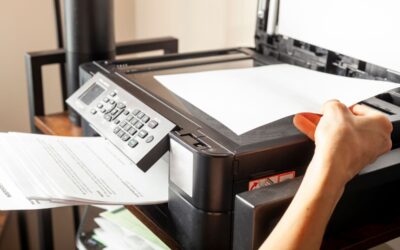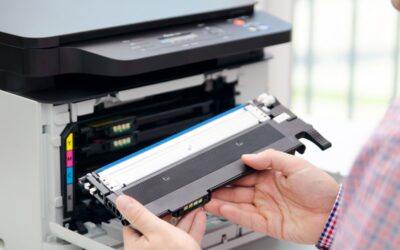Technology for printing and copying comes in all shapes and sizes, including lightweight and budget-friendly printers, sturdy workhorses, and many different types of multifunction machines. Printers, copiers, scanners, and fax machines are among the most common office equipment in work environments that need to be recycled.
The correct disposal of printers and ink cartridges is essential to freeing up office space, complying with company policies, and our planet’s well-being. In some states, you may face considerable fines if you do not properly dispose of your printer. What should you do when the time comes for your printer to be retired?
In a nutshell, it is called print recycling.
You can easily recycle your old printer, copier, and print cartridges. Most importantly, if you dispose of your printer responsibly, no toxic materials or e-waste will be left in landfills. All printers are recyclable, including inkjet, laser, 3D printers, large-format, industrial, and even mobile printers.
How to Prepare a Printer for Recycling
Below we list a few options you have when you are ready to recycle your printer:
- Our customers can take advantage of a complete recycling program at BDS. Printer systems, technology equipment, and toner cartridges at no charge.
- Is the equipment still functional? Schools, recreation centers, community organizations, charities, and nonprofit organizations can benefit from printer donations.
- Manufacturers may offer recycling and take-back programs for e-waste. However, you must repackage and pay to ship the printer back.
- Recycle your old printer at a retail store. Electronic recycling is readily available at several major retailers, making the process easy for both consumers and businesses.
- Find a recycling center near you. In most cases, you can recycle your printer at a recycling center or e-waste drop-off location that accepts electronic waste.
Importance of Print Recycling:
- Resource Conservation: Recycling printers conserve valuable resources such as metals, plastics, and electronic components. Recycling these materials means fewer raw materials must be extracted and processed, reducing environmental impact.
- Waste Reduction: Electronic waste, or e-waste, is a significant environmental concern due to its toxic components and slow decomposition rates. Recycling printers divert e-waste from landfills, where it leaches harmful substances into the soil and water.
- Energy Savings: Recycling printers saves energy. Recycling energy savings contribute to energy conservation and reduce greenhouse gas emissions associated with manufacturing processes.
- Prevention of Pollution: Improper printer disposal can lead to environmental pollution by leaching hazardous materials such as lead, mercury, and cadmium. Recycling printers prevents pollution by safely managing and treating electronic waste.
- Compliance with Regulations: Many regions, including printers, have regulations regarding electronic waste disposal and recycling. Proper recycling ensures compliance with these regulations and prevents legal liabilities associated with improper disposal.
Printer recycling is an essential component of responsible electronic waste management. By recycling printers and other electronic devices, we can conserve resources, reduce waste, and minimize environmental impact for a more sustainable future.
Managed Print Services and Print Recycling Together
When combined, MPS and print recycling create a comprehensive solution for managing printing needs sustainably. By outsourcing print management, organizations can ensure they are minimizing waste, maximizing efficiency, and adhering to green practices.
How to recycle a printer
Rather than throwing old printers away, consider recycling them. Several recycling programs and alternative methods are available for e-waste disposal, including used printers. BDS can replace your printer after it has been recycled; we offer various printers and copiers to fit your budget and workplace needs. BDS offers office recycling solutions in Massachusetts, Rhode Island, Connecticut, New Hampshire, and many other areas in New England and Florida.






